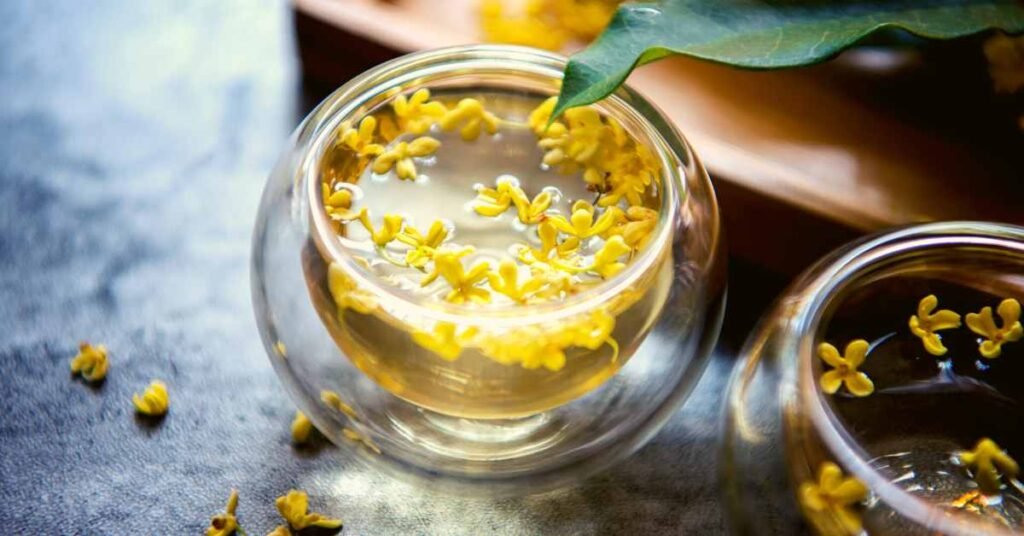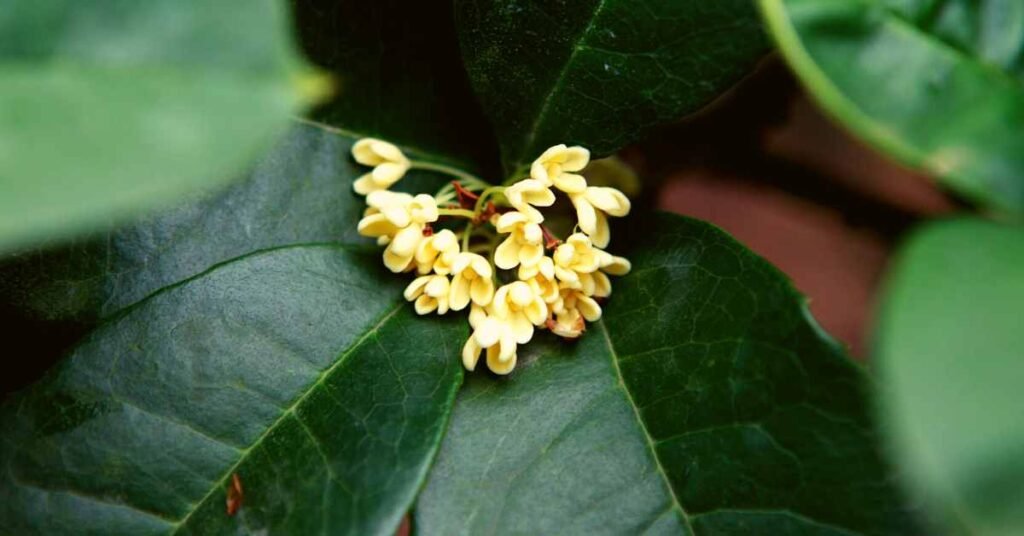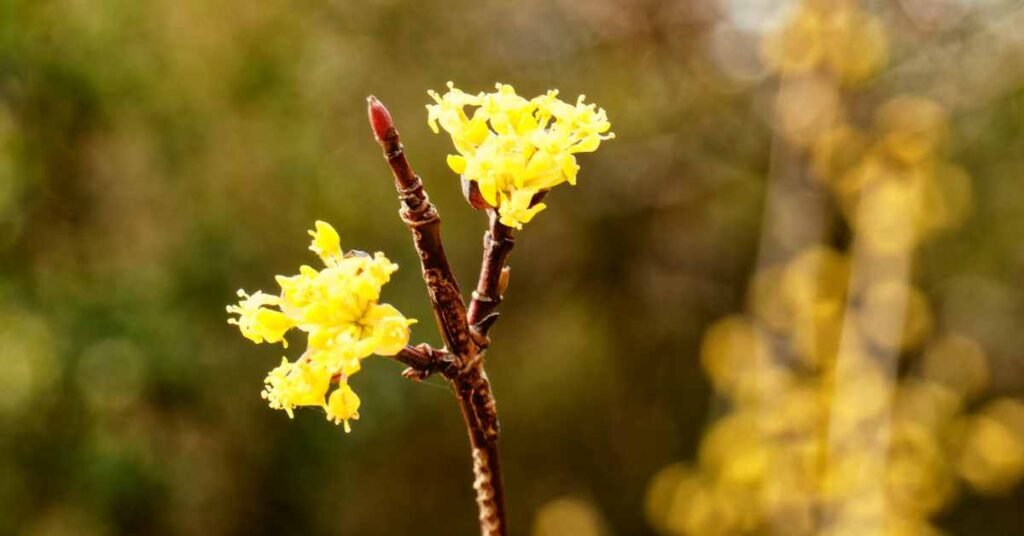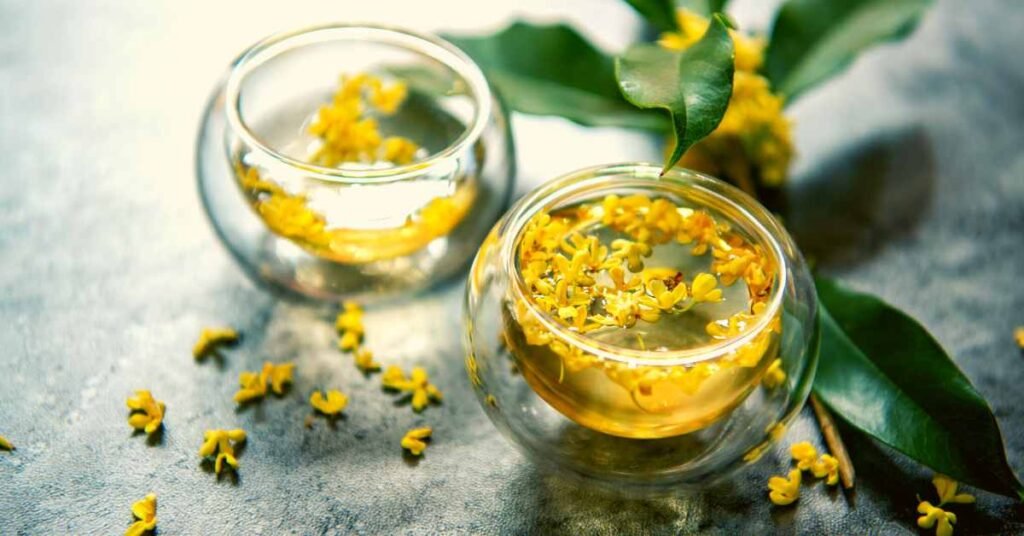In the vast world of teas, Osmanthus tea stands out as a fragrant and enchanting beverage with a rich history, remarkable properties, and a myriad of health benefits.
Originating from the delicate blossoms of the Osmanthus fragrans plant, this tea has been cherished for centuries in Asian cultures.
China, in particular, has a deep-rooted connection with Osmanthus tea, where it has been cultivated for over a thousand years.
The craft of infusing Osmanthus flowers with various tea bases, such as green, oolong, or black tea, demands a delicate touch and meticulous attention, ensuring the essence of the flowers harmonizes with the base tea without overshadowing its intrinsic qualities.
Origin and Cultivation

China, in particular, has a deep-rooted connection with Osmanthus tea, where it has been cultivated for over a thousand years.
The tea is crafted by infusing these fragrant blossoms with various tea bases, such as green, oolong, or black tea, to create a delightful fusion of flavors.
The delicate balance of blending Osmanthus flowers with tea leaves demands skill and precision, aiming to capture the essence of the flowers without overpowering the base tea.
Properties of Osmanthus Tea
1. Aromatherapy in a Cup:
The defining feature of Osmanthus tea is its exquisite aroma.
The sweet, floral fragrance not only tantalizes the taste buds but also provides a therapeutic experience akin to aromatherapy.
A steaming cup of Osmanthus tea can transport you to a tranquil garden, offering a moment of respite in a hectic day.
2. Delicate Flavor Profile:
Osmanthus tea boasts a mild, delicate flavor that complements the inherent characteristics of the chosen tea base.
The floral notes intertwine seamlessly with the base tea, creating a harmonious blend that is neither too overpowering nor too subtle. This makes Osmanthus tea an excellent choice for those seeking a refined and nuanced tea-drinking experience.
3. Antioxidant Rich:
Like many teas, Osmanthus tea is rich in antioxidants, which play a crucial role in combating oxidative stress in the body. These antioxidants help neutralize free radicals, contributing to overall well-being and potentially reducing the risk of chronic diseases.

4. Soothing and Relaxing:
Osmanthus tea is often praised for its calming properties. The gentle aroma and soothing warmth of the tea can have a relaxing effect on the mind and body.
It is a popular choice for those looking to unwind after a long day or to create a serene atmosphere during moments of self-reflection.
Health Benefits of Osmanthus Tea
1. Digestive Aid:
Osmanthus tea has been traditionally used to support digestive health.
The tea is believed to help alleviate indigestion, bloating, and other digestive discomforts. It is often consumed after meals to promote digestion and ease digestive processes.
2. Immune Boosting:
With its antioxidant content, Osmanthus tea may contribute to strengthening the immune system. Regular consumption of this tea may help the body defend itself against common illnesses and infections.
3. Skin Health:
The antioxidants present in Osmanthus tea may also benefit the skin. By neutralizing free radicals, these antioxidants can potentially slow down the aging process, promoting healthier and more youthful-looking skin.
4. Respiratory Support:
In traditional Chinese medicine, Osmanthus tea is often recommended for respiratory health. The gentle, floral aroma is believed to have a soothing effect on the respiratory system, making it a popular choice during cold seasons.

5. Regulating Menstrual Cycle
Osmanthus tea is an excellent choice for regulating menstrual cycle and it’s been used as a period aid for centuries.
Versatile Uses of Osmanthus Tea
1. Culinary Delight:
Beyond its role as a beverage, Osmanthus tea has found its way into the culinary world. The fragrant blossoms are used to infuse desserts, jams, and even liquors, adding a unique and sophisticated touch to various dishes.
2. Fragrant Infusions:
Osmanthus tea can be used as a fragrant infusion in other teas or herbal blends. Adding a few Osmanthus blossoms to your favorite tea can enhance the overall sensory experience, creating a delightful fusion of aromas and flavors.
3. Aesthetic Appeal:
Osmanthus tea, with its golden hues and delicate floral notes, is not only a treat for the taste buds but also a feast for the eyes.
It is often served in transparent teaware, allowing the beautiful blossoms to unfurl and dance in the water, creating a visually captivating experience.
4. Gift of Tranquility:
Osmanthus tea, packaged thoughtfully, makes for an excellent gift. Its aromatic allure and potential health benefits make it a gesture of care and tranquility, perfect for expressing well-wishes or gratitude.
Final Word

In the world of teas, Osmanthus tea emerges as a hidden gem, offering a sensory journey that transcends the ordinary.
From its origins in the ancient gardens of China to its versatile uses and potential health benefits, Osmanthus tea invites us to savor the delicate balance of nature’s bounty.
Whether sipped for its therapeutic aroma, embraced for its healthful properties, or incorporated into culinary creations, Osmanthus tea stands as a testament to the timeless allure of tea culture and the art of infusing daily rituals with elegance and tranquility.
MEDICAL DISCLAIMER
Itsnevernotteatime.com cannot and does not contain medical/health advice. The medical/health information is provided for general and educational purposes only and is not a substitute for professional advice.




